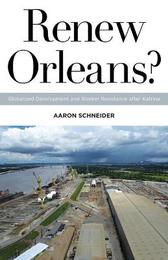
|
Renew Orleans?: Globalized Development and Worker Resistance after Katrina
Hardback
Main Details
| Title |
Renew Orleans?: Globalized Development and Worker Resistance after Katrina
|
| Authors and Contributors |
By (author) Aaron Schneider
|
| Series | Globalization and Community |
|---|
| Physical Properties |
| Format:Hardback | | Pages:264 | | Dimensions(mm): Height 216,Width 140 |
|
| ISBN/Barcode |
9781517901653
|
| Classifications | Dewey:307.34160976 |
|---|
| Audience | | General | | Professional & Vocational | |
|---|
| Illustrations |
14
|
|
Publishing Details |
| Publisher |
University of Minnesota Press
|
| Imprint |
University of Minnesota Press
|
| Publication Date |
27 March 2018 |
| Publication Country |
United States
|
Description
Urban development after disaster, the fading of black political clout, and the onset of gentrification Like no other American city, New Orleans since Hurricane Katrina offers powerful insight into issues of political economy in urban development and, in particular, how a city's character changes after a disaster that spurs economic and political transition. In New Orleans, the hurricane upset an existing stalemate among rival factions of economic and political elites, and its aftermath facilitated the rise of a globally oriented faction of local capital. In Renew Orleans? Aaron Schneider shows how some city leaders were able to access fragmented local institutions and capture areas of public policy vital to their development agenda. Through interviews and surveys with workers and advocates in construction, restaurants, shipyards, and hotel and casino cleaning, Schneider contrasts sectors prioritized during post-Katrina recovery with neglected sectors. The result is a fine-grained view of the way labor markets are structured to the advantage of elites, emphasizing how dual development produces wealth for the few while distributing poverty and exclusion to the many on the basis of race, gender, and ethnicity. Schneider shows the way exploitation operates both in the workplace and the community, tracing working-class resistance that joins struggles for dignity at home and work. In the process, working classes and popular sectors put forth their own alternative forms of development.
Author Biography
Aaron Schneider is Leo Block Chair and associate professor in the Josef Korbel School of International Relations at the University of Denver. He is author of State-Building and Tax Regimes in Central America.
Reviews"Aaron Schneider provides a compelling-and heretofore untold-story of how power and poverty in New Orleans were restructured after Hurricane Katrina. A must-read, Renew Orleans? is an epic account of how a globally-oriented elite secured political power amidst the chaos, attempted to rebuild the city in their image, and met fierce resistance by working people."-Steve Striffler, coeditor of Working in the Big Easy: The History and Politics of Labor in New Orleans "Aaron Schneider makes a unique contribution in situating New Orleans's political development, both pre- and post-Katrina, in relation to the city's evolving political economy. One of the book's distinctive contributions is that it connects the racial and cultural discourses through which local politics has been articulated to that evolving political economy and competition among governing elites. His analysis is deep, rich, and concrete; it makes an important intervention in the urban politics and political economy field and should be a touchstone for all subsequent scholarship on New Orleans."-Adolph Reed, Jr., University of Pennsylvania "Aaron Schneider's Renew Orleans? gives us an unprecedented account of labor conditions in post-Katrina New Orleans and a critical examination of elite power in the city. Drawing on a wealth of quantitative and historical material, Schneider captures the experiences of the Crescent City's laboring classes, whose plight has too often been neglected in popular celebrations of recovery. Renew Orleans? tells the story of those who are fighting for a more just New Orleans through unionization, community struggles, and sector-wide models of worker organizing."-Cedric Johnson, author of The Neoliberal Deluge: Hurricane Katrina, Late Capitalism, and the Remaking of New Orleans
|